 For too long a time–for half a century, in fact–psychiatry tried to interpret the human mind merely as a mechanism, and consequently the therapy of mental disease merely in terms of technique. I believe this dream has been dreamt out. What now begins to loom on the horizon is not psychologized medicine but rather those of human psychiatry
For too long a time–for half a century, in fact–psychiatry tried to interpret the human mind merely as a mechanism, and consequently the therapy of mental disease merely in terms of technique. I believe this dream has been dreamt out. What now begins to loom on the horizon is not psychologized medicine but rather those of human psychiatry
― Viktor E. Frankl, Man’s Search for Meaning
As Cecilia lay in her bed, she realized her entire body ached from head to little toe. She looked for a bell or cord – some way to communicate with the nursing staff to ask for some kind of relief from the pain. Finally, she felt around under her right side, and found a 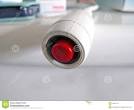 cord with a button at the end. She pressed the button. She heard nothing, and nothing happened. She pushed the button again, and then a third time. Finally, she kept her finger pressed down on the button as though her life depended on it. A nurse came sauntering into her room, removed the cord from her hand, and looked at her. “Tchem yah mah goo-vahm-pah motch?” The expression on the young nurse’s face indicated she was likely saying “May I help you?”
cord with a button at the end. She pressed the button. She heard nothing, and nothing happened. She pushed the button again, and then a third time. Finally, she kept her finger pressed down on the button as though her life depended on it. A nurse came sauntering into her room, removed the cord from her hand, and looked at her. “Tchem yah mah goo-vahm-pah motch?” The expression on the young nurse’s face indicated she was likely saying “May I help you?”
Cecilia gestured at her head, body and feet, and then made a grimace to indicate that her entire body ached from head to toe. Then she said, hopefully, “help?” The nurse replied, “No.” From the extent of her accent, it was clear the nurse’s English was non-existent. “May I at least have a drink of water?” Cecilia pointed at the cup on the bedside table. The nurse poured a few ounces of water into the cup, and handed it to her. Cecilia sipped slowly, and then laid back down on the pillow. The nurse she’d first seen, who by now Cecilia had nicknamed 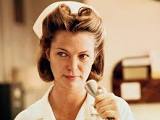 Nurse Ratched in her mind, walked in and nodded at the other nurse. The young gal rattled something off in Russian and hastily left. Nurse Ratched looked at Cecilia. “Don’t push this button anymore. We can give you nothing until x-rays come back. Nurse Tonya speaks no English, and is used to caring for elderly patients. You begin to pose problem for staff. You must lie quiet until x-rays come back.” Nurse Ratched left, after giving the sheets at the end of Cecilia’s bed a tuck and smooth. Cecilia took that as a not-so-subtle message that she was to lie in bed and not make any more trouble. Otherwise, there would be serious consequences.
Nurse Ratched in her mind, walked in and nodded at the other nurse. The young gal rattled something off in Russian and hastily left. Nurse Ratched looked at Cecilia. “Don’t push this button anymore. We can give you nothing until x-rays come back. Nurse Tonya speaks no English, and is used to caring for elderly patients. You begin to pose problem for staff. You must lie quiet until x-rays come back.” Nurse Ratched left, after giving the sheets at the end of Cecilia’s bed a tuck and smooth. Cecilia took that as a not-so-subtle message that she was to lie in bed and not make any more trouble. Otherwise, there would be serious consequences.
Cecilia laid back onto the pillow and tried to distract herself from her discomfort. She put her hand up to the left side of her head, touching the bandage that covered the wound and grimacing. Then she tried to piece together the events that had occurred in the recent past. She vaguely remembered being in someone’s room, talking about something. Another woman was in the room too, she thought. But it was all too hazy, and difficult to make any coherent sense of. And besides, thinking made her head hurt. Her vision was blurry, so reading was out of the question. There was no television in the room. She looked around for her laptop, but did not see it anywhere. A tear slowly began to slide down her left cheek. Cecilia turned her head to the right, and curled up into a ball. She fell asleep.
Her mind was filled with jumbled images. She saw herself standing on a ship, looking at a  horizon filled with billows of smoke. Then she saw herself looking at a
horizon filled with billows of smoke. Then she saw herself looking at a  picture of a family and crying. Finally, she saw her mother next to the dog,
picture of a family and crying. Finally, she saw her mother next to the dog,  Rubio. Her mother was calling to her, shouting something that Cecilia could barely make out. Finally, she realized her mother was telling her to come home and gesturing with the traditional winding arm that third base coaches use to tell a runner at third base to go home. Rubio’s head was gesturing for her to look up and to her left. Cecilia opened her eyes, looked up and to her left. A
Rubio. Her mother was calling to her, shouting something that Cecilia could barely make out. Finally, she realized her mother was telling her to come home and gesturing with the traditional winding arm that third base coaches use to tell a runner at third base to go home. Rubio’s head was gesturing for her to look up and to her left. Cecilia opened her eyes, looked up and to her left. A  woman holding a clipboard was sitting next to her bed.
woman holding a clipboard was sitting next to her bed.
The woman’s glasses on a black cord were sitting on her chest. She was flipping through some pages on the clipboard, finally coming to the fourth or fifth page. She lifted the spectacles to her face and looked at the page, squinting at some tiny handwriting at the bottom. Then she looked at Cecilia, who was looking back at her. The woman, startled, removed the glasses and put out her hand. “Good afternoon, Miss..uh…” she flipped back to the first page. “Miss Vasquez. I am Dr. Ludmila Tereshkova, the psychiatrist assigned to your case. How are you feeling?”
Cecilia tried to take in what she’d just heard from the woman. Psychiatrist? Case? How am I feeling? “I feel like shit,” replied Cecilia. “Ah hah,” replied Dr. Tereshkova, flipping back to the fifth page and writing at the bottom with a beautiful, 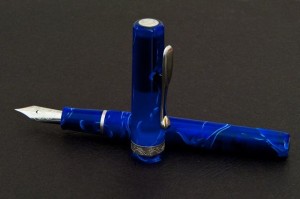 onyx and lapis fountain pen with a filigreed silver band around the base of the cap. After completing the note, the doctor put the cap back on the pen and looked at Cecilia. “The staff tells me you are a difficult patient. Their amateur diagnosis is hysterical depression. Do you think you are suffering from hysterical depression?” Dr. Tereshkova looked at her expectantly. Cecilia began to feel like she was a character in the movie
onyx and lapis fountain pen with a filigreed silver band around the base of the cap. After completing the note, the doctor put the cap back on the pen and looked at Cecilia. “The staff tells me you are a difficult patient. Their amateur diagnosis is hysterical depression. Do you think you are suffering from hysterical depression?” Dr. Tereshkova looked at her expectantly. Cecilia began to feel like she was a character in the movie 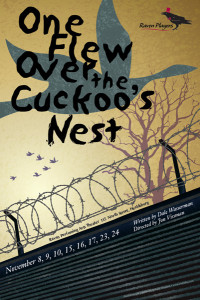 One Flew Over the Cuckoo’s Nest. Ironically, she did feel she was bordering on hysteria. She closed her eyes, took a deep breath, and summoned all her strength to avoid screaming at this woman. Cecilia began with, “If you’ll let me think for a moment, I’ll try to explain.” The doctor nodded, and sat back in her chair.
One Flew Over the Cuckoo’s Nest. Ironically, she did feel she was bordering on hysteria. She closed her eyes, took a deep breath, and summoned all her strength to avoid screaming at this woman. Cecilia began with, “If you’ll let me think for a moment, I’ll try to explain.” The doctor nodded, and sat back in her chair.
Cecilia continued slowly, desperately searching for the appropriate words to explain her situation. “I am Dr. Cecilia Vasquez. I am an American cosmologist. I was sent to Russia to work with 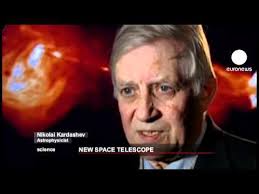 Dr. Kardashev on a matter of vital, international importance.” At this point, Cecilia stopped, realizing those words probably sounded like grandiose fantasy to Dr. Tereshkova. But the doctor let her continue and did not interrupt. Cecilia went on with “I came to this place to speak to someone who knew something about a problem Dr. Kardashev and I were trying to solve regarding some data. I believe I fainted, and hit my head on a table. That is what I recall thus far.”
Dr. Kardashev on a matter of vital, international importance.” At this point, Cecilia stopped, realizing those words probably sounded like grandiose fantasy to Dr. Tereshkova. But the doctor let her continue and did not interrupt. Cecilia went on with “I came to this place to speak to someone who knew something about a problem Dr. Kardashev and I were trying to solve regarding some data. I believe I fainted, and hit my head on a table. That is what I recall thus far.”
Dr. Tereshkova flipped back several pages. She read from the form “This says you were visiting with 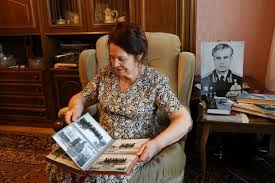 Olga Arkhipov when you fell ill. Do you recall that name?” Hearing Olga’s name triggered Cecilia’s recollection of the events leading up to her visit with Olga. “Yes, I met with Mrs. Arkhipov, and she helped me understand that a
Olga Arkhipov when you fell ill. Do you recall that name?” Hearing Olga’s name triggered Cecilia’s recollection of the events leading up to her visit with Olga. “Yes, I met with Mrs. Arkhipov, and she helped me understand that a  nuclear war occurred in 1962 between the United States and Russia. I explained all this to Dr. Kardashev and
nuclear war occurred in 1962 between the United States and Russia. I explained all this to Dr. Kardashev and  Stephen Hawking after my visit with Olga.” Dr. Tereshkova went back to the fifth page, unscrewed the cap on the beautiful fountain pen, and wrote down what she said. “And can you tell me where this conversation took place between you, Dr. Kardashev and uh..” The doctor glanced back at her notes. “Stephen Hawking?” Cecilia hastily replied “In Dr. Kardashev’s office. I went there when I left here. But I was having a hard time remembering how I got there. It is possible I have a touch of amnesia.” Dr. Tereshkova smiled. “Yes, I understand.” She continued to write notes on the bottom of the page.
Stephen Hawking after my visit with Olga.” Dr. Tereshkova went back to the fifth page, unscrewed the cap on the beautiful fountain pen, and wrote down what she said. “And can you tell me where this conversation took place between you, Dr. Kardashev and uh..” The doctor glanced back at her notes. “Stephen Hawking?” Cecilia hastily replied “In Dr. Kardashev’s office. I went there when I left here. But I was having a hard time remembering how I got there. It is possible I have a touch of amnesia.” Dr. Tereshkova smiled. “Yes, I understand.” She continued to write notes on the bottom of the page.
Once again, she put the cap on the fountain pen and looked closely at Cecilia. “After you fell and hit your head, you were brought to the emergency clinic to have your wound attended to. Then you were brought to this room, unconscious. You did not leave this facility after your injury. So, there was no conversation with anyone at all. Doctor Vasquez, any other psychiatrist in Russia would have you sent to the asylum if they’d heard what you just said. But I am not just any psychiatrist in Russia. I keep up with the latest developments in psychiatric technique, as they pertain to the aftermath of 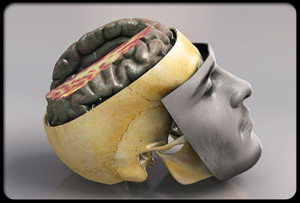 traumatic brain injury. And it says on these papers that a Tatiana Kardashev gave the information to the staff upon your admittance when you were injured. So I am going to give you the benefit of the doubt with some of what you say, at least regarding your relationship with the Kardashevs. But you must not speak about this nuclear war between our country and yours 6 decades ago. If you do, the staff will have you dispatched to
traumatic brain injury. And it says on these papers that a Tatiana Kardashev gave the information to the staff upon your admittance when you were injured. So I am going to give you the benefit of the doubt with some of what you say, at least regarding your relationship with the Kardashevs. But you must not speak about this nuclear war between our country and yours 6 decades ago. If you do, the staff will have you dispatched to 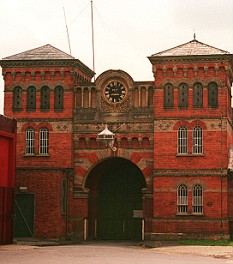 Moscow Psychiatric Hospital #1. Do we understand one another?” Cecilia nodded.
Moscow Psychiatric Hospital #1. Do we understand one another?” Cecilia nodded.
Dr. Tereshkova sat back in her chair, and tilted her head to the side. “I am hesitant to form a diagnosis at this point. I will write on your chart that you are suffering the after-effects of your travel, lack of nutrition, and emotional upset in addition to your physical injury. I am going to recommend only some recreational therapy for you. I believe we can use that technique to allow your brain some time to heal itself, and for you to overcome your emotional distress. Can you tell me what you do for recreation when you are at home?” Cecilia thought about that for a moment, and finally said “I enjoy following the  Miami Marlins baseball team. Other than that, I just work all the time.” Dr. Tereshkova sighed, and shook her head. “I see. Well, I don’t believe we have the facilities here for you to observe or participate in any baseball activities.” She thought for a moment, and then her face lit up. “But I do have a new piece of equipment that you could use to simulate a baseball game. Have you heard of virtual reality?” Cecilia nodded yes, still too stunned by the doctor’s previous threat of institutionalization to speak. “I have something called the
Miami Marlins baseball team. Other than that, I just work all the time.” Dr. Tereshkova sighed, and shook her head. “I see. Well, I don’t believe we have the facilities here for you to observe or participate in any baseball activities.” She thought for a moment, and then her face lit up. “But I do have a new piece of equipment that you could use to simulate a baseball game. Have you heard of virtual reality?” Cecilia nodded yes, still too stunned by the doctor’s previous threat of institutionalization to speak. “I have something called the  Oculus Rift personal 3-D viewer with a controller that accesses the internet. You could use that to enter virtual reality and seek out some form of recreation – possibly a baseball game. Would that be of interest to you?” Again, Cecilia nodded. She quickly surmised that she’d better cooperate with this doctor, or face going to a mental hospital for treatment in Russia. Just forming those words in her mind made her physically shudder. Then she knew such an outcome would very likely jeopardize the mission, and affect the entire world. Cecilia said, “I’d be pleased to work with you and this virtual reality equipment. I could certainly use a rest and some recreation.” Dr. Tereshkova smiled, patted her arm, and left. Cecilia exhaled hard and wondered if anything stranger than this could occur in her Russian adventure.
Oculus Rift personal 3-D viewer with a controller that accesses the internet. You could use that to enter virtual reality and seek out some form of recreation – possibly a baseball game. Would that be of interest to you?” Again, Cecilia nodded. She quickly surmised that she’d better cooperate with this doctor, or face going to a mental hospital for treatment in Russia. Just forming those words in her mind made her physically shudder. Then she knew such an outcome would very likely jeopardize the mission, and affect the entire world. Cecilia said, “I’d be pleased to work with you and this virtual reality equipment. I could certainly use a rest and some recreation.” Dr. Tereshkova smiled, patted her arm, and left. Cecilia exhaled hard and wondered if anything stranger than this could occur in her Russian adventure.
